
Rhodiola rosea is a perennial flowering plant in the family Crassulaceae. It grows naturally in wild Arctic regions of Europe, Asia, and North America, and can be propagated as a groundcover.

Bonamia is a genus of the flowering plant family Convolvulaceae, commonly known as the bindweed family and named after the French physician and botanist François Bonamy (1710-1786). Members of the genus are commonly known as the lady's nightcap.

Brodiaea coronaria is the type species of Brodiaea and also known by the common names harvest brodiaea and crown brodiaea. It is native to western North America from British Columbia to northern California, where it grows in mountains and grasslands.

Lawrencella is a genus of flowering plants in the family Asteraceae endemic to Australia.

Tephrosia rosea, commonly known as Flinders River poison, is a plant species, endemic to northern Australia. It is a shrub with an erect or sprawling habit, growing to between 0.2 and 2 metres high. Pink to purple flowers are produced throughout the year in the species' native range.
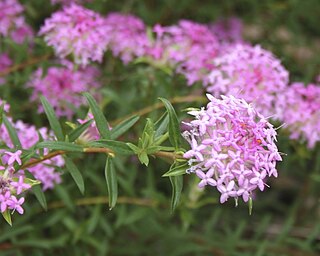
Pimelea rosea, commonly known as rose banjine, is a species of flowering plant in the family Thymelaeaceae and is endemic to the south-west of Western Australia. It is an erect shrub with narrowly elliptic leaves, and clusters of pale pink to reddish-purple flowers surrounded by 4 egg-shaped involucral bracts.
Verticordia luteola is a flowering plant in the myrtle family Myrtaceae, and is endemic to the south-west of Western Australia. It is a more or less openly branched shrub with crowded leaves on its side branches and spikes of pale yellow or bright pink flowers which turn cream to brownish as they age. This verticordia is a summer-flowering species.
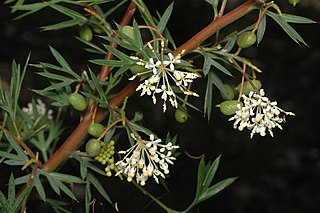
Grevillea phanerophlebia, commonly known as the prominent vein grevillea and the vein leaf grevillea, is a species of flowering plant in the family Proteaceae and is endemic to a restricted part of the south-west of Western Australia. It is an erect, spreading or straggly shrub with divided leaves, the lobes linear, and white and cream-coloured to yellow flowers.
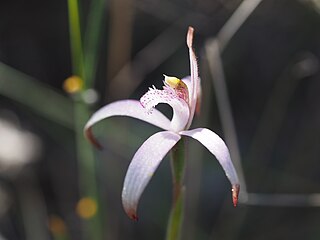
Caladenia hirta subsp. rosea, commonly known as the pink candy orchid or candy orchid, is a plant in the orchid family Orchidaceae and is endemic to the south-west of Western Australia. It is a widespread and common orchid which has a single leaf, up to three pale pink to deep pink flowers and often grows in clumps.
Bonamia alatisemina is a herb in the family Convolvulaceae.
Bonamia brevifolia is a herb in the family Convolvulaceae.
Bonamia linearis is a herb in the family Convolvulaceae.
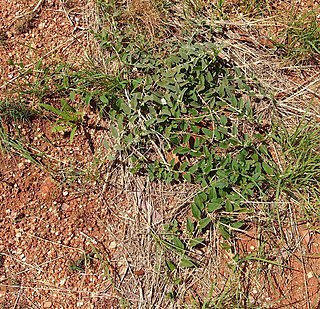
Bonamia media is a herb in the family Convolvulaceae.
Bonamia oblongifolia is a plant in the family Convolvulaceae.
Bonamia pannosa is a herb in the family Convolvulaceae.
Bonamia pilbarensis is a herb in the family Convolvulaceae.
Bonamia wilsoniae is a herb in the family Convolvulaceae that is native to Western Australia.
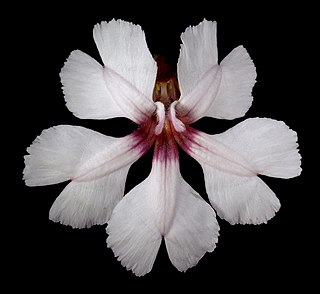
Velleia rosea is a species in the family Goodeniaceae that is native to Western Australia and flowers from April to October.
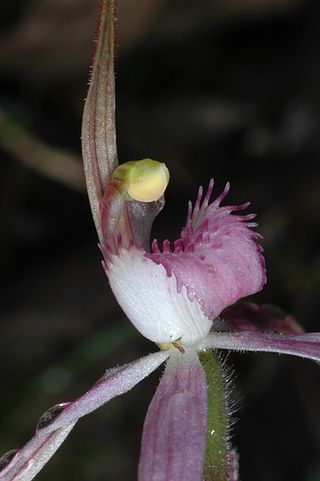
Caladenia rosea, also known as pink primrose orchid, is a plant in the orchid family Orchidaceae and is endemic to relatively inaccessible, high lateritic plateaux in a high rainfall area in south-western Western Australia. It is a terrestrial orchid with a single hairy leaf and up to three pink flowers on a thin, sparsely-hairy stem. It is similar to Caladenia flava but is distinguished by the perianth being pink to dark pink with prominent red striping and spotting on the dorsal sepal and lateral petals. Caladenia rosea mimics Hypocalymma robustum (Myrtaceae) in terms of flowering time, colour and scent.

Caladenia hirta, commonly known as sugar candy orchid, flowering plant in the orchid family Orchidaceae and endemic to the south-west of Western Australia. It is a ground orchid with a single broad, hairy leaf and up to six white or pink and white flowers with pink markings.











